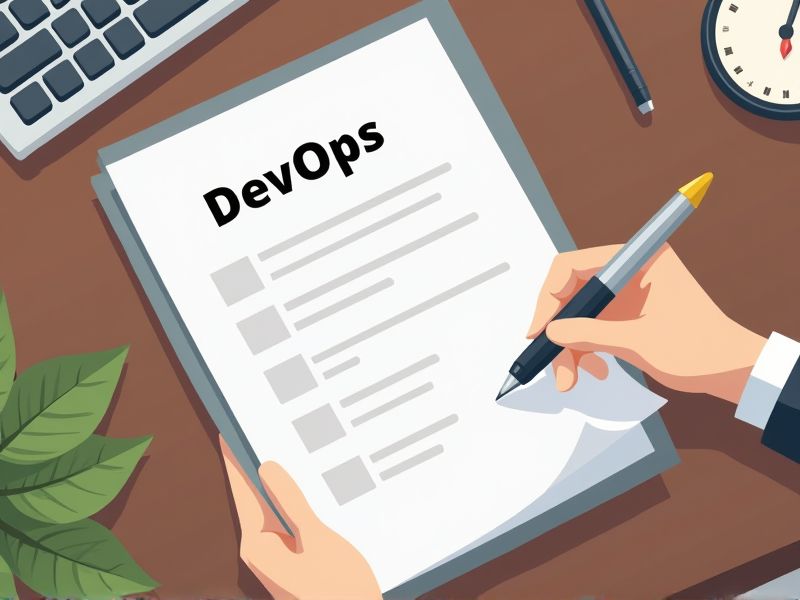
As the demand for streamlined software development and operations increases, organizations find value in DevOps practices. Certifications validate a DevOps engineer's proficiency, ensuring they can integrate tools and manage infrastructures effectively. These credentials are crucial for demonstrating updated skills and keeping pace with industry standards. Important certifications for a DevOps engineer are outlined here.
AWS Certified DevOps Engineer - Professional
The AWS Certified DevOps Engineer - Professional certification validates advanced technical skills and expertise in implementing and managing distributed applications on the AWS platform. Obtaining the certification enhances a DevOps engineer's ability to deploy, manage, and operate scalable and highly available applications, which is essential for organization-wide tech efficiency. This credential demonstrates proficiency in applying continuous delivery and automation, crucial for maintaining streamlined development processes. It also signifies an engineer's commitment to staying current with evolving AWS services and best practices in cloud computing.
Microsoft Certified: DevOps Engineer Expert
DevOps Engineer Experts with Microsoft certification are preferred because they possess verified skills in automating and streamlining IT processes. Certification ensures the engineer's ability to utilize Microsoft Azure effectively, optimizing operational efficiency. With validated knowledge in continuous integration and delivery, cost reduction and faster deployment cycles become achievable. Employers recognize certified professionals as being capable of implementing strong security and compliance controls, enhancing organizational trust.
Google Professional Cloud DevOps Engineer
Organizations increasingly adopt cloud-native technologies, Google Professional Cloud DevOps Engineers become crucial for optimizing infrastructure. This certification ensures engineers possess the expertise to manage and improve operational processes using Google Cloud's tools. As teams aim to scale applications efficiently, these engineers leverage automation, monitoring, and performance optimization skills to maintain service reliability. Evolving industry standards demand DevOps professionals stay updated, making this certification a way to validate proficiency in modern practices.
Certified Kubernetes Administrator (CKA)
The Certified Kubernetes Administrator (CKA) credential validates a DevOps engineer's proficiency in managing containerized applications using Kubernetes, enhancing their operational capabilities. Possessing the CKA provides evidence of the skills required to orchestrate system deployments at scale, which is vital for efficient DevOps pipelines. As organizations increasingly adopt Kubernetes for its automation in application deployment, having a certified expert ensures optimized resource management and reduced downtime. Given the complexity of Kubernetes environments, certified administrators can effectively troubleshoot, improving system reliability and developer productivity.
Docker Certified Associate
Docker Certified Associate certification validates a DevOps engineer's technical skills in containerization, which enhances their ability to streamline application management. This certification signals proficiency in Docker technology, which is crucial for optimizing DevOps processes like continuous integration and deployment. Holding this credential can increase a DevOps engineer's marketability in competitive job markets, as employers seek professionals who can efficiently deploy and manage containerized applications. Certification ensures a foundational understanding of Docker's capabilities, which can lead to more reliable and scalable software delivery pipelines.
Red Hat Certified Engineer (RHCE)
The Red Hat Certified Engineer (RHCE) certification provides proficiency in managing enterprise-level systems and automating workflows, crucial skills for a DevOps engineer. Organizations with DevOps roles demand expertise in automating CI/CD pipelines, and RHCE demonstrates capability in such areas. Knowledge of Red Hat tools and environments can enhance system reliability and integration with container orchestration platforms like Kubernetes. The certification also emphasizes effective security management, which is vital in maintaining the integrity and availability of scalable DevOps infrastructures.
HashiCorp Certified: Terraform Associate
Obtaining the HashiCorp Certified: Terraform Associate certification increases a DevOps engineer's credibility in infrastructure as code, specifically focusing on Terraform. This certification validates the engineer's ability to automate and manage complex infrastructure at scale, a core responsibility in DevOps. Companies relying heavily on cloud services require skilled professionals who can efficiently use Terraform for resource management and environment provisioning. This certification can lead to improved job prospects and potentially higher salary offerings, reflecting the growing industry demand for certified experts.
Certified Jenkins Engineer (CJE)
Achieving a Certified Jenkins Engineer (CJE) credential enhances a DevOps engineer's ability to manage and optimize continuous integration and continuous delivery (CI/CD) pipelines effectively. Jenkins, a leading automation server, requires specialized knowledge to customize and troubleshoot in diverse integration scenarios. The CJE certification provides validation of one's skills and knowledge in using Jenkins proficiently, ensuring reliable software delivery. Hiring certified professionals can reduce potential downtimes and technical debt, as they often handle complex automation tasks more efficiently.
DevOps Foundation Certification (DevOps Institute)
Acquiring the DevOps Foundation Certification from the DevOps Institute ensures a comprehensive understanding of DevOps principles, which enhances team collaboration and integration. This certification offers validation of an individual's skills in leveraging automation, continuous delivery, and agile methodologies. Employers often recognize this certification as a benchmark for efficiency and innovation in managing IT operations and development. It helps engineers keep pace with evolving tools and best practices in the rapidly changing DevOps landscape.
Certified Agile Leadership (CAL)
Certified Agile Leadership (CAL) equips DevOps engineers with leadership skills that enhance collaboration and team alignment, fostering a culture of continuous improvement. Effective Agile leadership helps in breaking down silos, which accelerates the feedback loop and enhances the integration of development and operations. Understanding Agile principles through CAL enables DevOps engineers to drive change and adaptability in fast-paced environments. CAL promotes the cultivation of an organizational mindset that prioritizes customer value, improving the effectiveness of DevOps practices.
Summary
When you, as a DevOps engineer, obtain certifications, you enhance your skills and credibility. This often leads to increased job opportunities and potentially higher salaries because employers recognize verified competency. Companies might also rely on your expertise for critical projects, driving organizational success. Gaining certifications can position you as a leader within the DevOps community, influencing industry practices.
